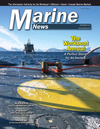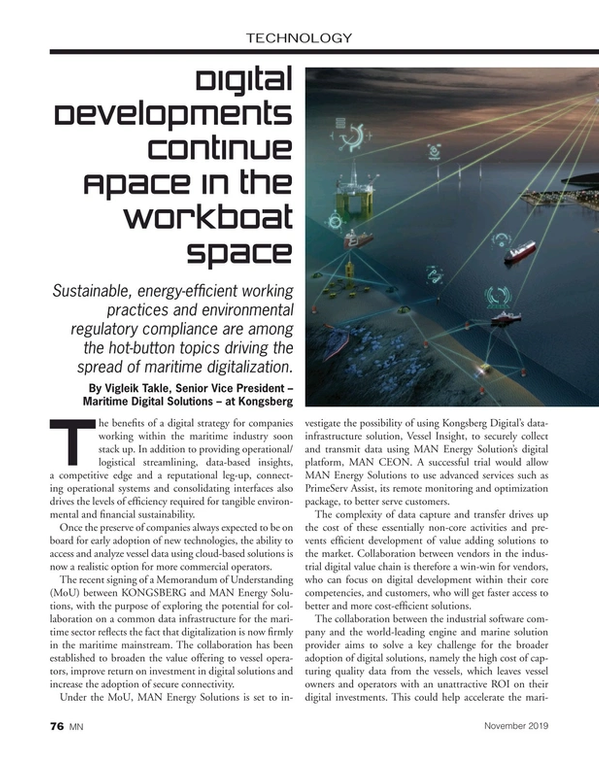
Digital Developments Continue Apace in the Workboat Space
Sustainable, energy-efficient working practices and environmental regulatory compliance are among the hot-button topics driving the spread of maritime digitalization.
The benefits of a digital strategy for companies working within the maritime industry soon stack up. In addition to providing operational/logistical streamlining, data-based insights, a competitive edge and a reputational leg-up, connecting operational systems and consolidating interfaces also drives the levels of efficiency required for tangible environmental and financial sustainability.
Once the preserve of companies always expected to be on board for early adoption of new technologies, the ability to access and analyze vessel data using cloud-based solutions is now a realistic option for more commercial operators.
The recent signing of a Memorandum of Understanding (MoU) between KONGSBERG and MAN Energy Solutions, with the purpose of exploring the potential for collaboration on a common data infrastructure for the maritime sector reflects the fact that digitalization is now firmly in the maritime mainstream. The collaboration has been established to broaden the value offering to vessel operators, improve return on investment in digital solutions and increase the adoption of secure connectivity.
Under the MoU, MAN Energy Solutions is set to investigate the possibility of using Kongsberg Digital’s data-infrastructure solution, Vessel Insight, to securely collect and transmit data using MAN Energy Solution’s digital platform, MAN CEON. A successful trial would allow MAN Energy Solutions to use advanced services such as PrimeServ Assist, its remote monitoring and optimization package, to better serve customers.
The complexity of data capture and transfer drives up the cost of these essentially non-core activities and prevents efficient development of value adding solutions to the market. Collaboration between vendors in the industrial digital value chain is therefore a win-win for vendors, who can focus on digital development within their core competencies, and customers, who will get faster access to better and more cost-efficient solutions.
The collaboration between the industrial software company and the world-leading engine and marine solution provider aims to solve a key challenge for the broader adoption of digital solutions, namely the high cost of capturing quality data from the vessels, which leaves vessel owners and operators with an unattractive ROI on their digital investments. This could help accelerate the maritime transformation, where new technology and digital solutions enable a move towards smarter, more efficient, safer and greener operations.
From MAN’s perspective, digitalization supports its commitment to help its customers increase the safety, reliability and predictability of their individual vessel performance and overall fleet. Through the cooperation with KONGSBERG, MAN aims to securely onboard customers faster to provide our new digital services, advanced analytics and support; areas in which it can provide unique benefits to their business. The company is also expecting faster development of its core functionality, supported by a stronger focus and customer interaction.
Maritime Digitalization: fundamentals in practice
Clearly, the benefits outlined above all point to the three cost-reducing and business-enhancing fundamentals of maritime digitalization: asset lifecycle optimization, value chain transformation and operational excellence. The first of these simply equates to maximizing the profits achievable from a company’s assets over their complete working life, from planning and acquisition through to operation and maintenance (and, finally, disposal).
Value chain transformation, meanwhile, involves the integration of a company’s financial and operational structures in order to strengthen and coordinate the overall corporate framework while achieving transparency between internal departments and third-party agents. In regard to operational excellence, this encourages firms to automate key processes from the ground up, starting with basic administrative functions – for example, installing analytical dashboards, moving from paper to digital logbooks – but potentially leading to increased autonomy in the operation of custom-designed, state-of-the-art vessels.
One example of the latter, an uncrewed and remotely-operated fireboat series design named RALamander, is currently under development by Vancouver-based naval architects and marine engineers Robert Allan Ltd in collaboration with Kongsberg Maritime. The thinking behind the fireboat’s flexibly autonomous capabilities is simply to enable first responders to tackle hazardous port fires involving explosion risks or toxic smoke more rapidly and assertively than would previously have been possible, while the firefighters themselves can control operations via a remote console in conditions of total safety. The deployment of Kongsberg Maritime’s low-latency, high-bandwidth control and communications system means that the semi-portable operator console can be located on a manned fireboat, tug or pilot boat as appropriate.
If the RALamander fireboat series represents digital technology’s future potential, the fact remains that there are still maritime companies out there still working within a traditional framework of manual processes which are becoming less relevant, practicable and competitive with every passing day. As the industry moves inexorably towards integration and automation in everything from supply chains and logistics to vessel control and port operations, the need to adopt a considered long-term digital strategy becomes ever more pressing.
Integrated digital platforms
An admitted stumbling block for some is the perceived enormity and expense of collating, consolidating, encrypting, storing, sharing and leveraging all-important data streams from numerous different sources, all the while balancing transparency with confidentiality – and maintaining stringent cyber security protocols. The fear is that having to use a series of different applications to access data stored in multiple discrete databases would be time-consuming, costly, vulnerable and a hindrance to the provision of a joined-up view, with all the disadvantages for decision-making and profit margins that this would entail.
It might seem like the logical way to deal with these issues at a stroke is for companies to adopt an integrated digital platform which acts as a unified, central, single-source library for digital applications. KONGSBERG’s solution, however, is an open, collaborative, cloud-based ecosystem named Kognifai. Already eliciting positive feedback from early adopters and partner firms, the platform represents a cogent argument for the business potential of shared, integrated, open-source applications. It is in effect a digital marketplace and operational platform.
Along with the new Kognifai enabled Vessel Insight solution, it supports the maritime industry’s general migration towards shore-based management systems which can leverage advanced data analytics, derived from onboard sensors, to optimize fleet operations, servicing intervals and the allocation of spare parts. The same information-sharing principles would also provide vessel crews with the at-a-glance knowledge necessary to ensure observance of strict environmental compliance laws, while also enabling them to trade route and voyage details with port authorities to facilitate port operations and reduce the likelihood of congestion occurring.
If the benefits arising from a well-coordinated digital strategy are inarguable, some gently persistent encouragement may still be necessary to persuade certain firms to take up the reins. The most prudent advice in such cases is to begin with a manageable digital overhaul of processes such as log-keeping, accounts, predictive maintenance scheduling and customer service. A larger-scale digital plan of action can then, if desired, be gradually rolled out across all sectors of a company’s business. The future is already upon us: and only the best-prepared should expect to emerge on the far side of the digital revolution with a smile and an ongoing, viable business.
Vigleik Takle is the Senior Vice President – Maritime Digital Solutions – at Kongsberg.
This article first appeared in the November 2019 print edition of MarineNews magazine.
Read Digital Developments Continue Apace in the Workboat Space in Pdf, Flash or Html5 edition of November 2019 Marine News
Other stories from November 2019 issue
Content
- BY THE NUMBERS: the OSV Markets page: 10
- INSIGHTS: Sean Fernstrum, President, R.W. Fernstrum page: 14
- SAFETY: Dollars & Sense page: 26
- ISO: Affordable & Reliable Workboat Comms page: 30
- BOATBUILDING: From Estonia with Love page: 54
- REGULATORY REVIEW: Subchapter M page: 60
- DECK MACHINERY: A Step Up in Safety page: 70
- Blount Boats: Ferries, Offshore Wind both Dominate Present, Future page: 72
- Digital Developments Continue Apace in the Workboat Space page: 76
- DOMESTIC DREDGING: U.S. Ports Require a Diverse Fleet page: 80
- Navigating the Rough Waters of Marine Certification page: 88


